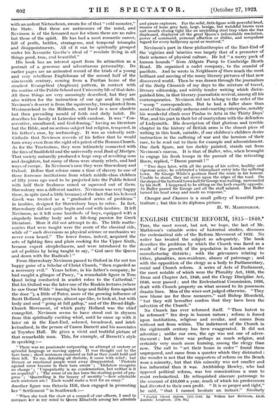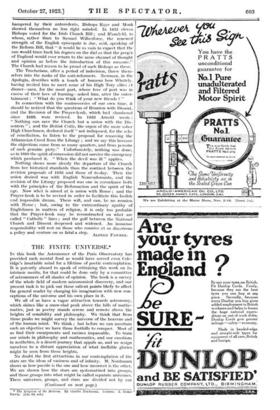ENGLISH CHURCH REFORM , 1815-1840.* Tins, the most recent, but not,
we hope, the last of Mr. Mathieson's valuable series of historical studies, discusses the ecclesiastical side of the Reform Movement of 1832. No writer has treated the subject so adequately. The book describes the problems by which the Church was faced as a result of the growth of the population in London and the manufacturing districts ; with the grievances relating to tithes, pluralities, non-residence, abuses of patronage ; and with the opposition of the clergy as a body to Parliamentary, social and Church reform. A series of Acts of Parliament, the most notable of which were the Plurality Act, 1838, the Dean and Chapter Act, 1840, and the Clergy Discipline Act, 1840, were passed ; and the Ecclesiastical Commission, 1836, dealt with Church property on what seemed to its possessors drastic lines. Men of the wiser sort judged otherwise. "They now blame me for these measures," said Bishop Blomfield, " but they will hereafter confess that they have been the salvation of the Church."
No Church has ever reformed itself. " Thou latest to be reformed " lies deep in human nature ; reform is forced Upon institutions, religious and secular, and comes from Without not from within. The indictment of the Church in the eighteenth century has been exaggerated. It did not advertise ; unlike our own, the age was not one of adver- tisement ; but there was perhaps as much religion, and certainly very much more learning, among the clergy than now. The call to " set their house in order " found them unprepared, and came from a quarter which they distrusted : the wonder is not that the supporters of reform on the Bench were a minority, but that this minority was not smaller and fess influential than it was. Archbishop Howley, who had Opposed political reform, was too conscientious a man to resist ecclesiastical. He relinquished sinecure patronage to the amount of £10,000 a year, much of which his predecessors had diverted to their own profit. " It is so proper and right," he said, " that I cannot hesitate an instant." Similarly • English Church Reform, 1315-1340. By William Law Mathlcson, LL.D. London: Longraans. [lOs, Od.J
hampered by their antecedents, Bishops Kaye and Monk showed themselves no less right minded. In 1833 eleven Bishops voted for the Irish Church Bill ; and B!omfield, to whom, rather than to Samuel Wilberforce, the renewed strength of the English episcopate is due, said, speaking of the Reform Bill, that it would be as vain to expect that the sun would trace back his degrees on the dial as that the peop7e of England would ever return to the same channel of thought and opinion as before the introduction of this measure." The Church had reason to be proud of such Bishops as these.
The Tractarians, after a period of indecision, threw them- selves into the ranks of the anti-reformers. Newman, in the Apologia, describes with a touch of humour how Whately. having invited him to meet some of his High Tory allies at dinner—men, for the most part, whose love of port was in excess of their love of learning—asked him, atter the enter- tainment : " What do you think of your new friends ? "
In connection with the controversies of our own time, it should be noticed that the questions of Reunion with Dissent, and the Revision of the Prayer-book, which had slumbered since 1689, were revived. In 1833 Arnold wrote . " Nothing can save the Church but a union with the Dis- senters " ; and the British Critic, the organ of the more sober High Churchmen, declared itself " not indisposed, for the sake of conciliation, to listen to the proposal for removing the Athanasian Creed from the Liturgy ; and we say this because the objections come from so many quarters, and from persons of such genuine piety." Unfortunately, nothing was done, as in 1689 the spirit of concession did not survive the emergency which produced it. " When the devil was ill " applies.
Nothing shows more clearly the departure of the Church from her historical standards than the contrast between the revision proposals of 1833 and those of to-day. Then the union desired was with English Nonconformists, and the revision of the Liturgy proposed was one in Accordance both with the principles of the Reformation and the spirit of the age. Now what is aimed at is union with Rome ; and the Prayer-book is to be revised in order to facilitate this foolish and impossible dream. There will, and can, be no reunion with Rome ; but, owing to the extraordinary apathy of Englishmen in matters of religion, it is only too probable that the Prayer-book may be reconstructed on what are called " Catholic " lines ; and the gulf between the National Church and Dissent deepened and widened. An immense responsibility will rest on those who connive at so disastrous a policy and venture on so fatal a step. ALFRED FAWKES.















































 Previous page
Previous page